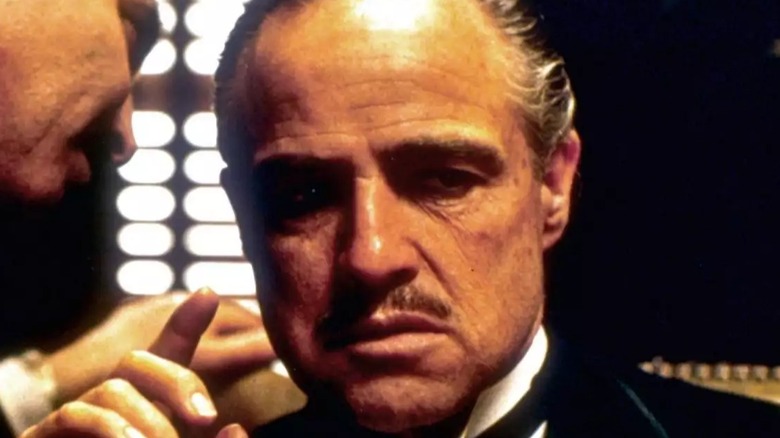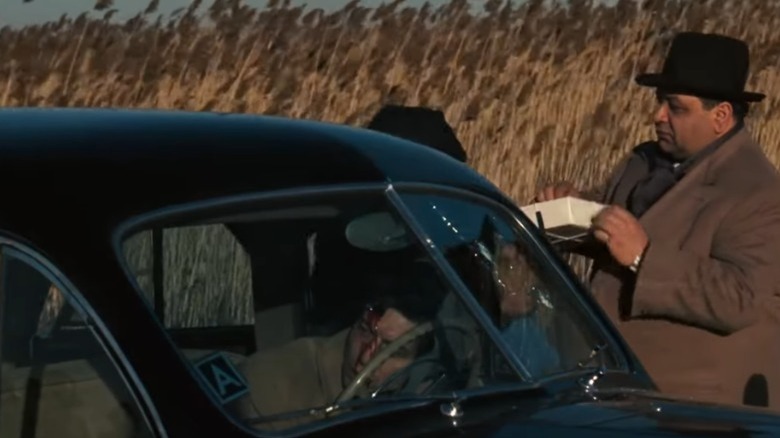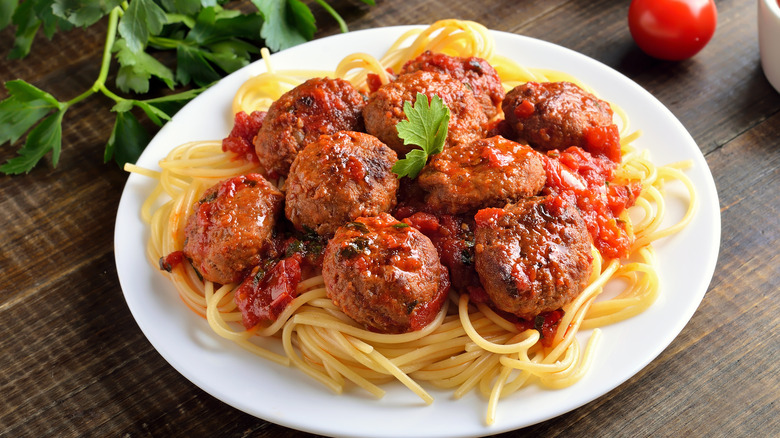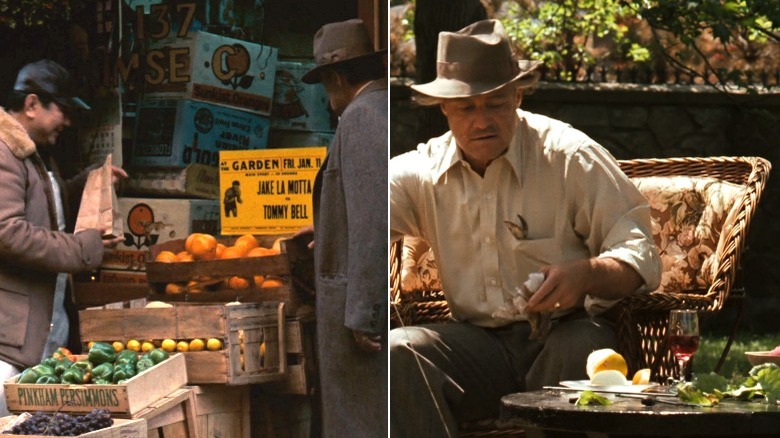Why The Food Scenes In The Godfather Mean More Than You Think
"The Godfather" is one of those classic movies that you can almost taste. While following both the bloodline and blood trail of the Corleone family, the audience is given frequent glimpses into the distinct food culture of, yes, a crime family, but also Italian-American immigrants. Whether they're chowing down on Chinese takeout (another unique culinary tradition born from the kitchens of immigrants), slurping down noodle-covered gravy (red sauce) before a major hit, or slicing wedding cakes, The Godfather is chock-full of food scenes.
But in Francis Ford Coppola's "The Godfather" — arguably one of the most important films of all time, per Rotten Tomatoes – nothing is one-dimensional, nor accidental. Not only is every meal significant, but each dish and even ingredient can tell us a story about family and food history. We dug into just three of the most important food messages found in The Godfather to uncover some of their hidden meanings.
Leave the gun, take the cannoli
After a brutal hit takes place on a dirt road, Peter Clemenza, played by Richard S. Castellano, utters one of the most iconic lines of all time, let alone lines about food: "Leave the gun. Take the cannoli." Cannoli is a Sicilian dessert that was originally made for Carnevale, but is now a year-round favorite, and a staple at many Italian and Italian-American eateries. La Cucina Italiana notes that the tubular and cream-filled pastries were used as a less-than-subtle nod to fertility and procreation. As Clemenza walks away from the car, toting his pristine white box of cannoli, this moment is a commentary on the cruel circle of life, without the sugar coating.
Additionally, it gives us insight into the mentality of a mobster — how do these mafia men commit atrocities but still make it on time for mass and Sunday dinner with the family? By leaving the gun and taking the cannoli, Clemenza shows an ability to leave the nastiness of the daily business behind him, only taking the sweet remainders back home with him.
Clemenza's Sunday Sauce
Clemenza also provides the audience with his ideal Sunday sauce recipe: "You see, you start out with a little bit of oil. Then you fry some garlic. Then you throw in some tomatoes, tomato paste, you fry it; you make sure it doesn't stick. You get it to a boil; you shove in all your sausage and your meatballs. And a little bit of wine, and a little bit of sugar, and that's my trick." This dish is significant because while Sunday sauce is a standard part of both Italian and Italian-American life, the innovation of adding meatballs is unique to Italian-American cuisine.
Smithsonian Magazine reports that Italian immigrants, the majority of whom came to the United States between 1880-1920, went from spending roughly 75% of their income on food in Italy, to just 25% in the US, thanks to larger paychecks and disposable income. This caused dramatic shifts in how folks prepared Italian cooking. Meat became the center of dishes, rather than an occasional treat. And so one of the main tensions of "The Godfather" is called to the center stage — the desire for immigrants to stay true to their roots while adapting to new culinary and economic cultures.
Oranges are an omen
The Corleones hail from Sicily, a southern Italian island known the world-over for its gorgeous produce made possible by Mount Etna, an active volcano that has produced spectacularly fertile soil, notes Visit Sicily. In particular, Sicily is renowned for oranges and lemons. Citrus fruit is seen throughout "The Godfather," whether it's in crystal bowls on dinner tables or growing freely in Italian orchards. But two major moments that feature oranges stand out above the rest.
First, while Vito Corleone is shopping at a produce market, he asks a grocer to bag up a few oranges. As he's preparing to pay, he notices two men approaching and quickly realizes he is about to be gunned down. Then, he scrambles to flee and retreat to his car, but succumbs to gunshots, kicking over a basket of oranges in the process. The fruits sprawl on the pavement as he falls, collapsing alongside them.
Vito survives this assassination, but meets his demise before the film's end. Sitting in his own sun-laden garden, Vito beckons his grandson to come over and see him. He slices the peel off of an orange, and places the peel in his mouth to amuse the child. After he chases the boy through the plants, he collapses suddenly, and presumably dies shortly after. A Sicilian export, the oranges are a warning symbol of death for Brando's Corleone.



